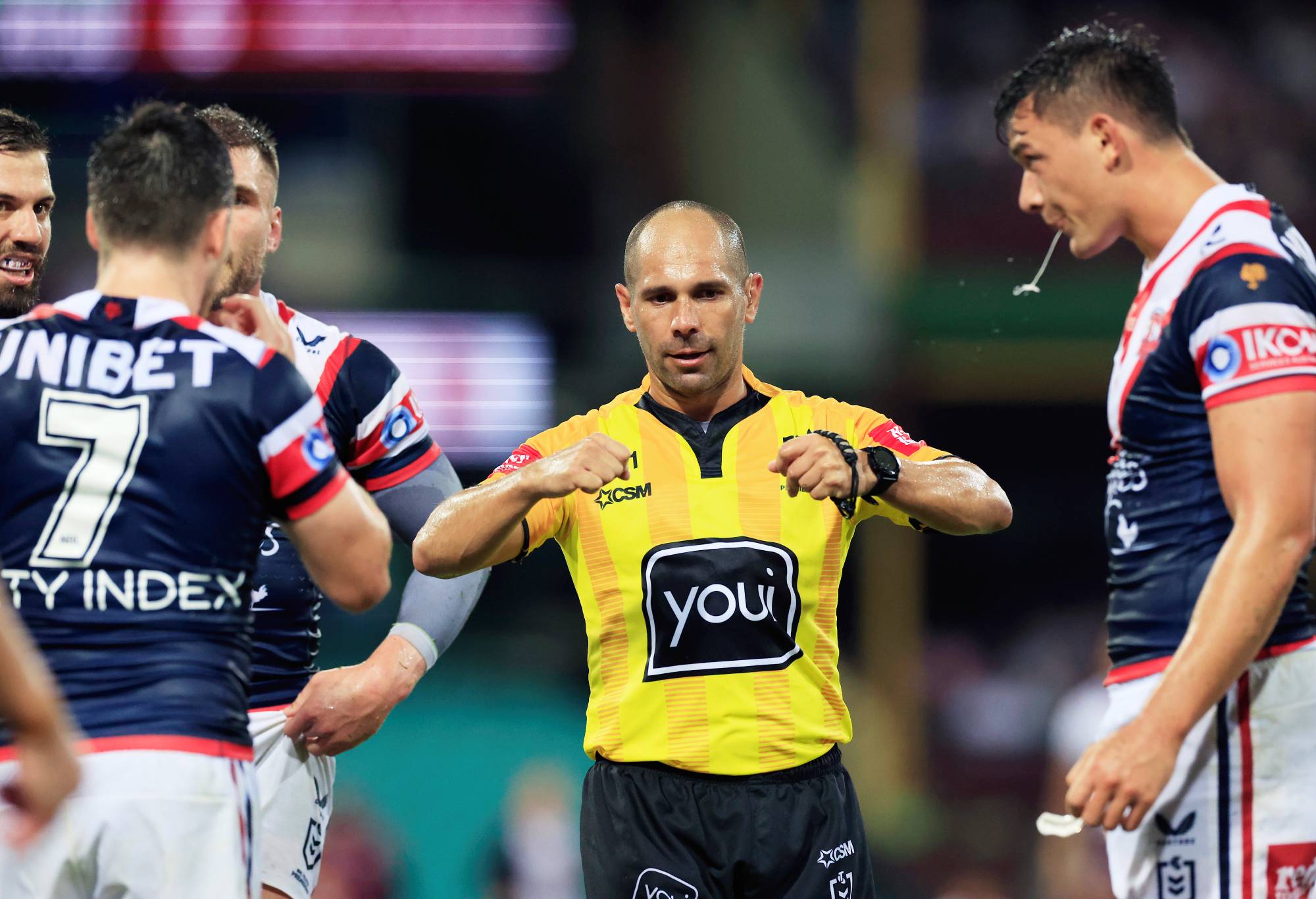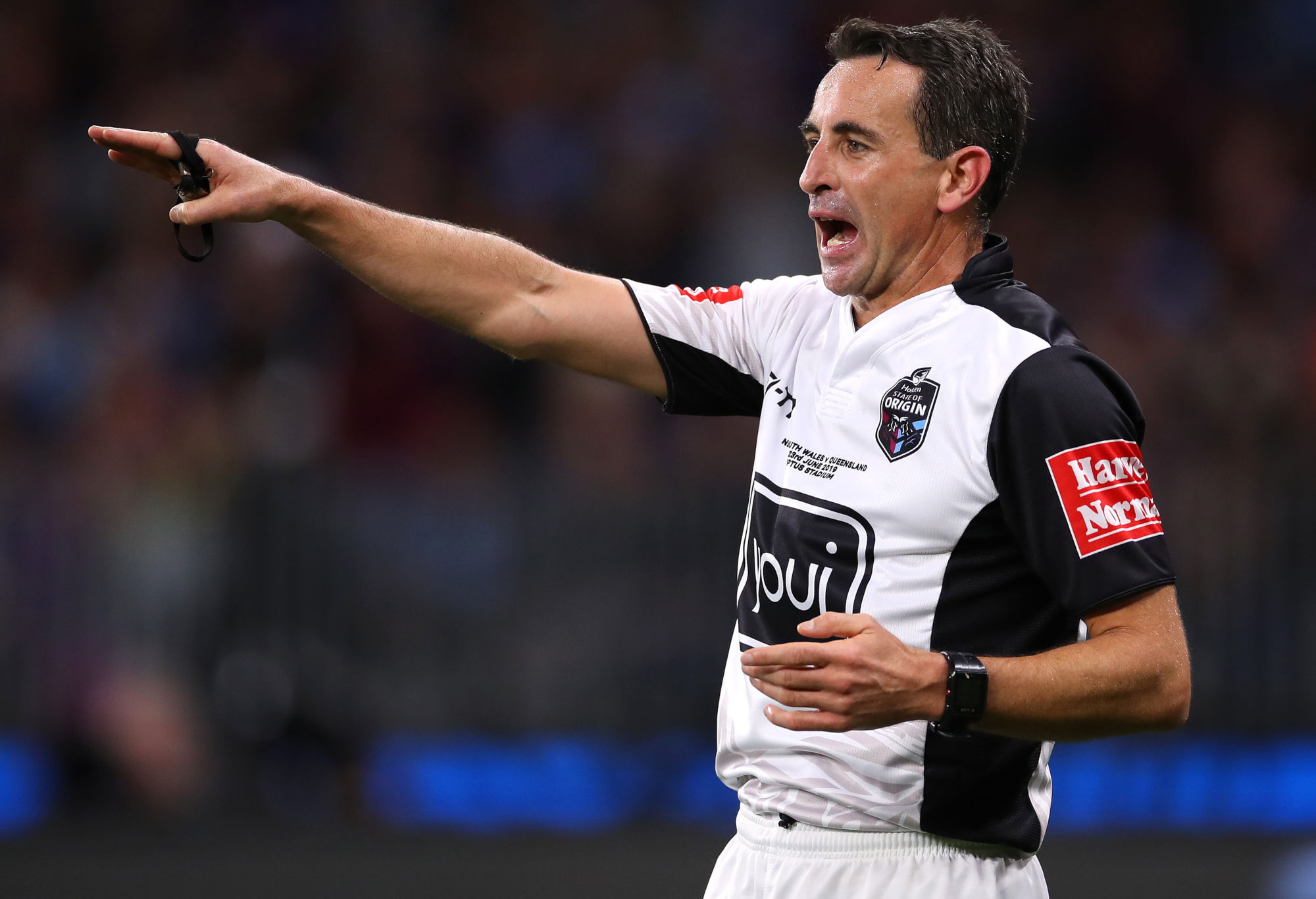According to Matty Johns, Paul ‘Chief’ Harragon famously told his teammates before his Knights won the thrilling 1997 decider to rip in against fierce rivals Manly, because “no one gets sent off in a grand final”.
While he may have been talking in a different context about a different era, the quote somewhat rings true today.
Players may not get away with the bash and crash, sometimes-dangerous physicality of the pre-1990s game – in fact, quite the opposite – but it’s become little secret that the referees officiate the finals and State of Origin differently to the rest of the NRL season.
Despite the denials, the whistles go away, the Bunker eases off on the rewind button and/or players are placed on report and dealt with after the game rather than face on-field sanctions all the time.
Apart from the Leo Thompson sin-binning at the end of the Cowboys’ win over the Knights, which was an obvious call to make and some fans even wanted a send-off, there were a lot of calls that were called play on, and allowed to be picked up in the match review.
That’s the way that it should be. The game was allowed to flow more freely – and low and behold – there was hardly any controversy about the decision-making.
Penalties weren’t necessarily less in number, but by not trying to be pedantic, decisions did not influence the outcome of games or become a disruption.
Win a Ziggy BBQ for Grand Final day, thanks to Barbeques Galore! Enter Here.
The main blow-up was over the Roosters forward pass, but that was instinctive from the referee and not definitively the decisive factor in the 20-point defeat.
There has been criticism of Manly’s try to Daly Cherry-Evans and the halfback not packing into the scrum properly. As important as that would have been for the Bulldogs not to have that try stand given the margin, it’s an infringement consistently not paid all year.
So technically, yes they got it wrong, but it’s probably more likely the officials weren’t even looking for that because of so much else to check in the play (there was also a potential obstruction that was cleared). Remember, we don’t want Bunker reviews to slow the game down.
Even the two other big Bunker calls – Reuben Cotter’s try against Newcastle and Stephen Crichton’s against Manly – seemed to be fair enough.
So, what’s the problem, you may ask? If this is the way the game can be refereed during a finals series, why can’t it happen every week?
There is no need for the penalty-a-thon that occurs week in and week out during the season.
That’s not to say there weren’t errors and inconsistencies, there definitely were, but the referee didn’t feel the need to blow his whistle for the slightest infringement – nor did the Bunker tip off the referee about acts of foul play.
Let’s start with Haumole Olakau’atu for Manly in the clash with the Bulldogs. Midway through the second half, the Manly forward was tackled by two Bulldogs as Viliame Kikau came over the top and collected him in the back of the head.
There wasn’t much in it in terms of force and he was falling in the tackle and play-on was the right call, but fans had every right to be nervous with all the penalties awarded mid-season for head contact.
Even Andrew Voss cheekily quipped: “He’s staying down to ensure the Bunker has a look at this one”.
His co-commentator Steve Roach also picked up the high hit.
“He’s hit him in the head … Wow, a glancing blow, but I have seen them pulled up this season,” Blocker said during the game.
If someone with the reputation of being a hard man such as ‘Blocker’ has changed his dial so much that he is even surprised when the slightest of contact is not penalised, you something isn’t right with consistency.

(Photo by Mark Evans/Getty Images)
Two days earlier, Connor Watson was placed on report for a crusher tackle on James Fisher-Harris. It didn’t go further and the Rooster wasn’t even charged. Again the right call was made.
Later, in the same game, James Tedesco elbowed Mitch Kenny while in possession. It was completely missed by the officials on the field as play continued, but the Roosters fullback was fined $1000 after the game.
Just one week ago, his teammate Angus Crichton was penalised and placed on report for the same offence running into the line and raising the elbow, giving Souths possession.
There was also a Daniel Tupou hip drop on Brian To’o that the Panthers winger jumped straight to his feet from. To be fair, you’d have to rewind the play a few times to work out there was actually an offence from the Rooster.
But one the Bunker had no excuse for missing, was Sunia Turuva’s attempted trip where he stuck the leg out at James Tedesco as he tried to sneak past after collecting the ball at dummy half.
“It looked like there was a trip there by Turuva and Tedesco is blowing up,” Mick Ennis said immediately after the incident, before a replay could be shown.
There were 14 players charged with tripping throughout the season, most were placed on report or picked up in the post-game review.
Most were so subtle and understandably missed in live play, but there’s no way that with all the Bunker picks up, the officials could completely have missed this – it would have been a choice to let it go.
The point of going through all these moments with a fine-tooth comb is not to nitpick or to highlight refereeing mistakes for the sake of it.
Instead, to prove that the constant string of misdemeanours that we see in our game during the season, creating controversy and stealing headlines, don’t actually stop occurring because the best teams make the final eight.
It’s the referees who make a choice to be more lenient when the games mean more; and are more of a spectacle for the game’s brand.

(Cameron Spencer/Getty Images)
It’s not new in 2024 that the referees take a different approach to big games. Remember the infamous ‘crackdown’ of Magic round where 14 players sin-binned and three sent off – not to mention all the penalties.
Everything that came in contact with the head was penalised and picked up, frustrating long-suffering rugby league fans – some have never recovered.
So, in the 2022 State of Origin series, Cherry-Evans thought he’d be safe using a captain’s challenge after being tapped on the head during a tackle from Jack Wighton.
“The contact from Jack Wighton is just a touch. The Challenge is unsuccessful,” The Bunker official explained in his decision.
Commonsense gave way to the pedantic freezeframing of moments to try and find a black-or-white call – and this weekend, most decisions were seen in the context of the game.
Not isolated incidents to hang, draw and quarter offenders for the slightest offence – or raising the coffers at the NRL with all the monetary fines.
The officials have choices, and the product that we saw in week 1 of the finals was great – and most importantly shows you don’t need to over-penalise a game to get a fair and balanced outcome.
